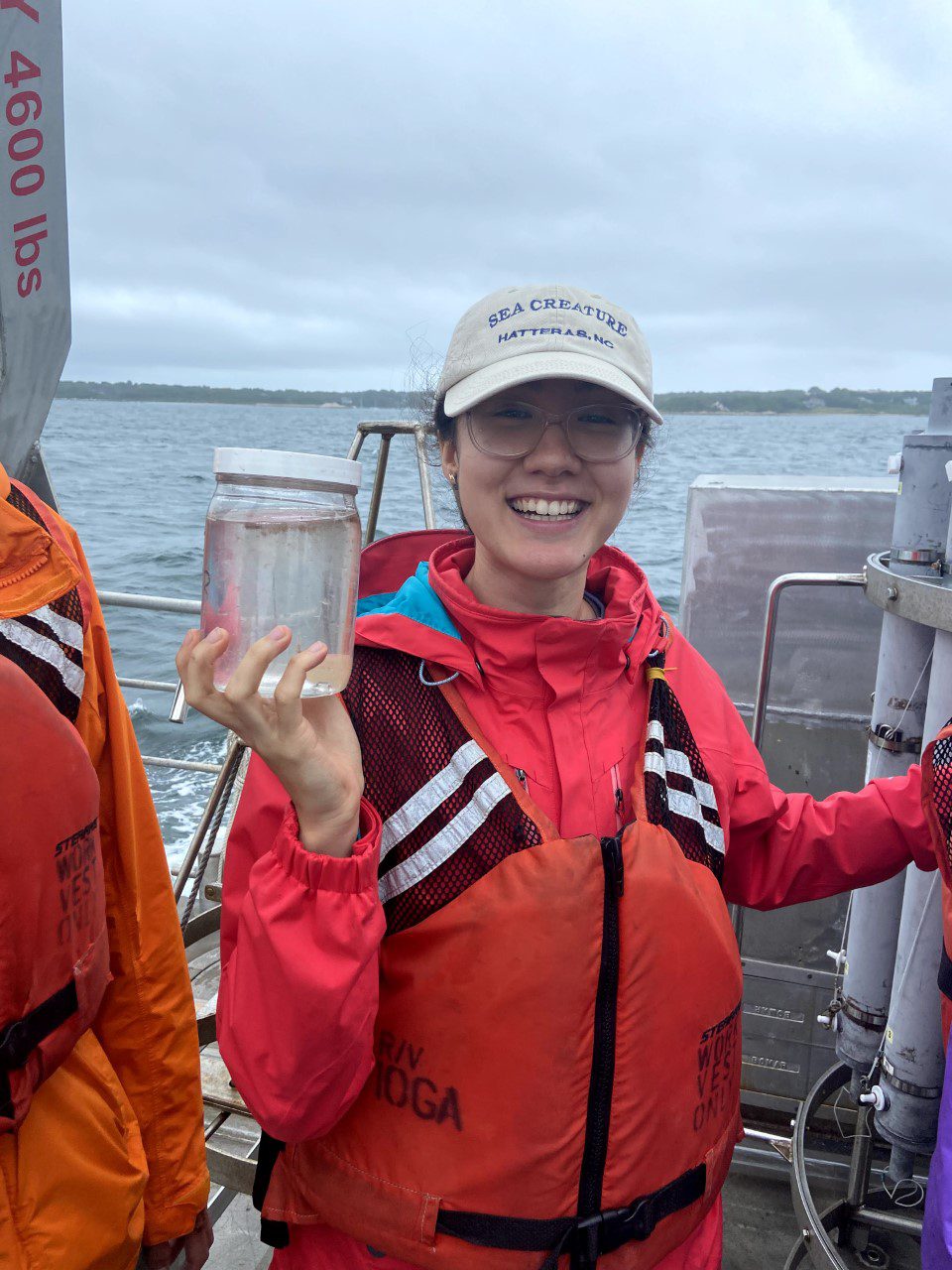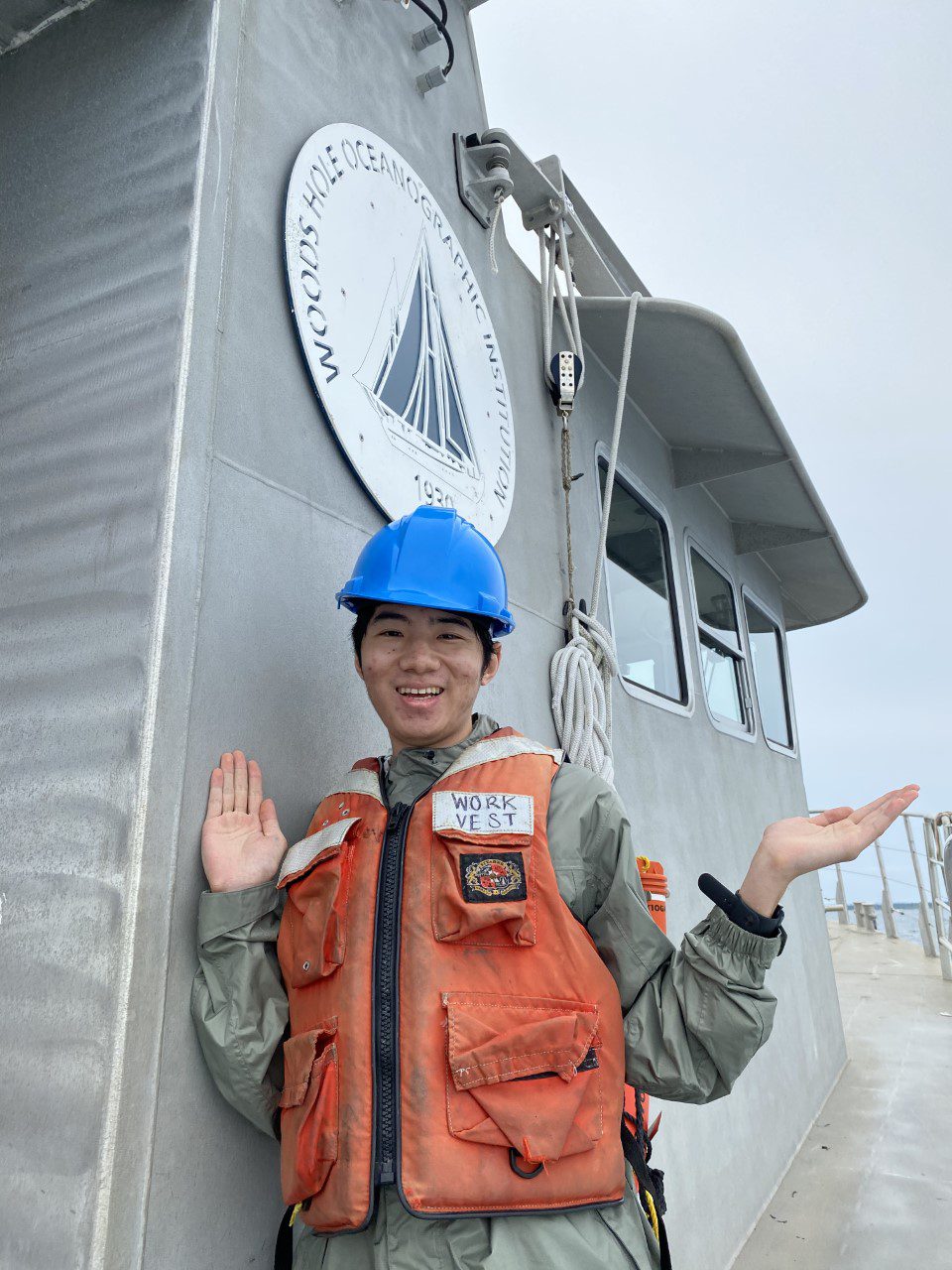Research Highlights

A Surr-eel Summer of Research: Modeling Future Eel Populations
Jisun Reiner, Macaulay Honors College at Hunter College
For the past four years, eels have been following me. These fish are the reason I decided to pursue environmental science in my senior year of high school, when I participated in a citizen science project that tracked eel populations in the Hudson River. It was a serendipitous and hilarious moment when my WHOI advisor, Dr. Di Jin, suggested that I explore the recent rise in eel aquaculture for my Summer Student Fellow research project in the Marine Policy Center.
My project aimed to understand the drivers of eel population decline and demand since 1990. The concurrent decline in eel stocks and rising demand for the fish has led to a significant upsurge in global eel aquaculture. However, the continued harvest of eels puts the fish at risk for extinction. To further complicate matters, the breeding habits of Anguillid eels, eels of the genus Anguilla, remains a mystery to humans. Therefore, aquaculture depends entirely upon glass eels caught in the wild.
The majority of my research involved collecting data about economic trends in the eel market since 1990 and analyzing these data in MATLAB. After studying historical and current trends, I modified a pre-existing biological model to estimate eel recruitment under various fishing management scenarios. I was quite shocked to learn that even when fishing for eels is completely banned, eels would still need 60 years to reach their historical population levels. The continued harvest of eels at current rates will likely lead to extinction, emphasizing the need for management plans that protect the Anguillid eel.
I felt very fortunate to study the complex biology of eels from a virtual setting. Though working online can be tiring at times, I was able to recharge with other Fellows in our communal Zoom room. Zoom allowed us the opportunity to work together even when we were physically apart. Our virtual interactions entered the in-person world when the Fellows met for a week in August. Meeting and connecting with like-minded, ocean-loving humans in Woods Hole can only be a magical experience. And magical it was. From seeing bioluminescence to sharing laughs and songs at the bonfire, living at WHOI solidified the friendships we had formed over Zoom. Everyone at WHOI expressed genuine support for our research, and this excitement for learning and sharing science will inevitably inspire me in my upcoming endeavors.
The Summer Student Fellowship has shaped my vision for the future in many ways. SSF has motivated me to pursue a field in marine sciences and provided me with a network of scientists I can learn from. Perhaps eels have not been following me for the past four years, but have been guiding me towards this summer at Woods Hole.

Exploring changes in abyssal water properties in the Southwestern Indian Ocean
Hiroki Nagao, University of Oxford
This past summer, I worked with Viviane Menezes and Heather Furey to investigate long-term changes in temperature and salinity in the Madagascar-Mascarene and the Weddell-Enderby Basins, using WOCE and GO-SHIP hydrographic data collected in 1995/96 and 2018/19. During WOCE and GO-SHIP cruises, conductivity-temperature-depth-oxygen (CTDO) sensors measure temperature, salinity, pressure, and oxygen concentration along a hydrographic section. These observations are essential for quantifying long-term changes in the physical properties of abyssal water.
Offshore of Antarctica, cold, dense water sinks to form the Antarctic Bottom Water (AABW). This water mass is the dominant source of abyssal water in the global ocean and thus forms a critical component of the global deep ocean circulation. In turn, this circulation influences the global climate and biogeochemical cycles by regulating the transport and storage of heat, freshwater, oxygen, and carbon. In the Southwestern Indian Ocean, AABW is likely sourced from the Weddell-Enderby Basin and spreads to the Crozet, Madagascar, and Mascarene Basins.
Recent studies have suggested that abyssal water in the Madagascar Basin has cooled over the past four decades, based on hydrographic data from 1985 to 2015. However, comparisons between WOCE data from 1995/96 and GO-SHIP data from 2018/19 suggested that abyssal water in the Madagascar-Mascarene Basin has been warming. Further statistical tests will provide insights whether the observed temperature change in both ocean basins was significant. To make an accurate interpretation of salinity change in the abyssal water, corrections for measurement biases were needed but were not possible under the timeframe of the fellowship.
Despite the SSF program being moved to a mostly virtual format due to the COVID-19 Pandemic, our weekly lab meetings and the mentoring program with the current graduate students in the MIT-WHOI Joint Program (JP) were a valuable opportunity for networking in the oceanographic community. I also enjoyed immersing myself with ongoing research projects in WHOI through the Summer Lecture Series and the weekly departmental seminars. Some of the JP students even organized trivia competition nights for the SSFs on Gather.
The one-week in-person component of the SSF program was a wonderful opportunity to explore WHOI’s research facilities, from the Alvin submersible to the mooring instruments to be deployed as part of the Ocean Observatories Initiative (OOI). The day cruise on the R/V Tioga exposed me to various facets of oceanographic fieldwork, from operating a CTD rosette to collecting plankton (and lots of comb jellies) using a net. I was able to cement friendships with the other SSF interns and graduate students through activities from swimming at beaches during sunset to exploring the towns and the geology of Martha’s Vineyard.
I am incredibly grateful to participate in this year’s SSF program and hope that I can go back to WHOI one day. Immersing myself with the scientists and students with the passion for studying the oceans and mitigating ongoing environmental issues inspired me to pursue a graduate career in oceanography. I am continuing to keep in touch with the people at WHOI and planning to present my research at the Ocean Sciences Meeting in Honolulu this coming February.
